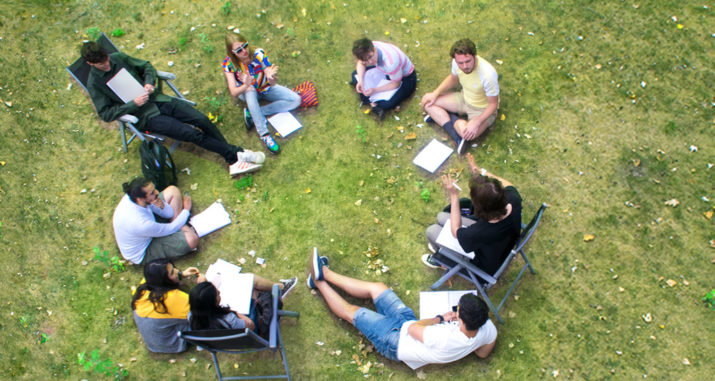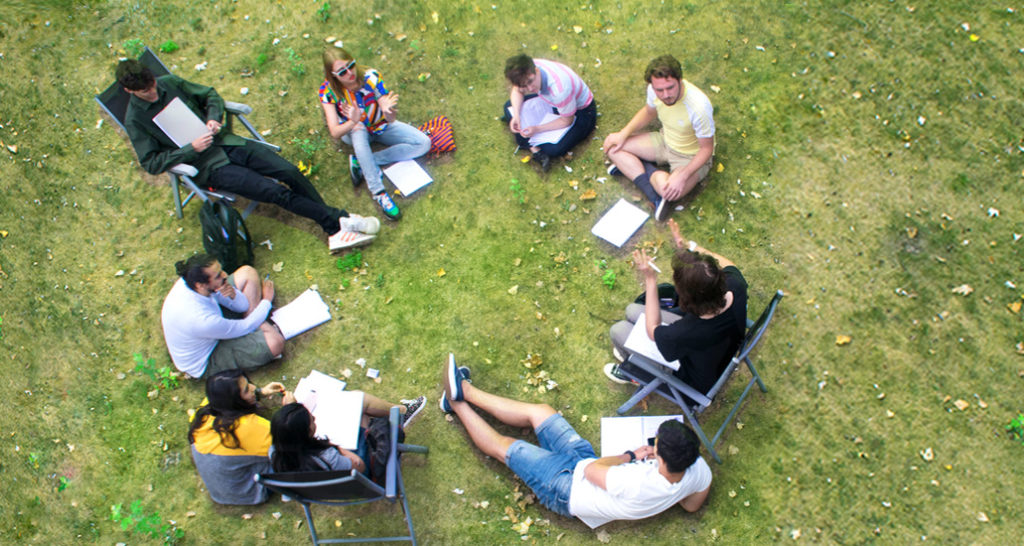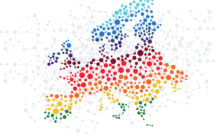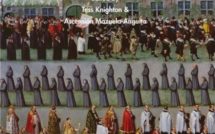

This is part of our Campus Spotlight on Bard College Berlin.
A Lexicon of Migration is a collaborative, interdisciplinary, and international course based on the observation that migration affects everyone today, regardless of their own migratory status. Drawing on discussions and exchanges with colleagues from across the Bard International Network (Al-Quds Bard College, American University of Central Asia, Bard College, and Bard College Berlin) and serving as our version of the core course for the Mellon-funded Consortium on Forced Migration, Displacement, and Education (Vassar College, Sarah Lawrence College, Bennington College, Bard College, and Bard College Berlin), the course aims at advancing liberal arts students’ understanding of migration both in the specific local contexts in which they study, as well as from international perspectives. Through a series of joint assignments, students engage with their peers and professors from other campuses.
Unpacking the workings of colonial histories and racial capitalism, the course puts emphasis on the uneven geopolitical developments that produce specific forms and taxonomies of migration. Based on the academic articles and chapters, documents, poetry, essays, and fiction selected by faculty from the network and affiliated colleges, students familiarize themselves with the UN refugee system, regional and national policies regarding migration, the challenges that emerge from them, as well as the ways in which they can be contested. Besides the biweekly in-class discussions, the course includes film screenings, guest lectures by Prem Kumar Rajaram, Fatin Abbas, Özlem Savaş, and Christian Haid, as well as off-campus walks and visits.
Recognizing the importance of language in how we think of and experience migration, selected readings help students engage critically with a range of concepts such as belonging, border, movement, citizenship, and solidarity. One of the joint cross-campus projects, for which my class is paired up with the American University of Central Asia, is a keyword assignment. Inspired by Raymond Williams’ 1976 Keywords: A Vocabulary of Culture and Society and Maribel Casas-Cortes et al’s 2014 collaborative project “New Keywords: Migration and Borders”, the assignment brings together students from across Bard network campuses to work collaboratively on selected terms related to migration and critically discuss the taxonomies that emerge in the process.
SYLLABUS
Course description
As one of the most important features of today’s globalized world, migration remains highly debated on local, national, and international levels. Migration is assigned various meanings and statuses (high-skilled and low-skilled, legal and illegal, documented and undocumented, forced and voluntary, restricted and unrestricted), which are, in turn, contested in multiple ways through grassroots and individual activism, academic and artistic interventions, as well as the work of local and international NGOs. Today, migration affects everyone regardless of their own migratory status, and many contemporary societies – especially but not exclusively their urban centers – have been described as pluralist, post-migrant, or super-diverse. The Lexicon of Migration course critically explores migration from global and local perspectives, emphasizing the role of social inequalities in producing specific forms and taxonomies of migration. The selected readings will help students examine diverse social experiences of migration, as well as a range of related concepts such as belonging, border, movement, citizenship, and solidarity, among many others. Students will familiarize themselves with the UN refugee system, regional and national policies regarding migration, the challenges that emerge from them, as well as the ways in which they are contested. By the end of the semester, students will have gained insight into various histories of migration, migration regimes, and migrant infrastructures. Designed by scholars and educators from across the Bard International Network (AlQuds University in Palestine, American University of Central Asia in Kyrgyzstan, Bard College in the United States, Bard College Berlin in Germany), as well as faculty and students from the Mellon-funded Consortium on Forced Migration, Displacement, and Education (Vassar College, Sarah Lawrence College, Bennington College, Bard College, and Bard College Berlin), the course aims at advancing students’ understanding of migration both in the specific local contexts in which they study, as well as from international perspectives. Through a series of joint assignments, students will have a unique opportunity to engage with their peers and professors from other campuses.
Readings
You will need a course reader (please purchase it in the library) and a copy of Tayeb Salih’s 1966 novel Season of Migration to the North(a few copies will be available on the reserve shelf in the library). On a weekly basis, you will be expected to devote about 4 hours to complete all the readings. As you read the assigned texts, please remember to annotate them: write down questions, comments, observations – we will use them as a basis for our class discussions. Please note that several of the readings (marked red in the syllabus) will be shared across the Bard network campuses taking part in this co-taught course initiative.
Assignments
Several assignments will add up to your final grade for this class alongside your participation grade: 1) an image assignment (10%); 2) a visual response to a prompt (10%); 3) a keyword (20%); 4) a 3000-word academic essay (30%). Most of the assignments will be developed in several stages, which will allow you to revise your and your peers’ work. The deadlines listed in the box below refer to the final deadlines. Please make sure to check the syllabus schedule regularly for the in-between deadlines and details regarding the assignments. You will receive grading criteria for each assignment separately.
ASSIGNMENT 1a: Find an image that in your mind depicts or engages with migration. Email the image to Agata by 25 January (if you are not the author of this image, make sure to include its source and author). Caption the image, write a 500-word explanation how this image engages with migration, and add 3 hashtags. Prepare to briefly (3 min) present your chosen image in relation to one or both of the texts assigned for 28 January.
Week 1: The Worlds of Migration
28 January
- Hegde, Radha S. Mediating Migration. Cambridge: Polity, 2016. 1-15.
- Mitchell, WJT. 2012. Migration, Law, and the Image: Beyond the Veil of Ignorance. In: Seeing Through Race. Cambridge: Harvard UP, 126-148.
30 January
- Massey, Doreen. 1994. A Global Sense of Place.
- De Haas, Hein. 2014. What Drives Human Migration? In: B. Anderson and M. Keith (eds) Migration: A COMPAS Anthology. Oxford: COMPAS, 2014.
Week 2: Forced Displacement and Refugees 1
4 February
- The 1951 United Nations Convention Relating to the Status of Refugees
- UNHCR Forced Displacement in 2017 (Global Trends Report)
ASSIGNMENT 1b: In-class hashtag exercise.
6 February
- Arendt, Hannah. 1943. We, Refugees. Altogether Elsewhere: Writers on Exile. Ed. Marc Robinson. Boston: Faber & Faber, 110-119.
- Said, Edward. 2000. Reflections on Exile and Other Essays. Cambridge: Harvard UP,
- Nayeri, Dina. 2017. The Ungrateful Refugee: We Have No Debt to Repay. The Guardian.
- Shire, Warsan. 2011. Conversations about Home. Teaching My Mother How to Give Birth.
Week 3: Forced Displacement and Refugees 2
11 February
- deGenova, Nicholas. 2017. Introduction to The Borders of “Europe” and the European Question. Durham: Duke UP. 1-24.
- Crawley, Heaven, et al.2017. Unravelling Europe’s ‘Migration Crisis’: Journeys over land and sea. Bristol: Policy Press. Excerpts.
ASSIGNMENT 1c: Students revise their original 500-word statement and 3 hashtags and email them to Agata by 15 February.
13 February
- Malkki, Liisa. 1996. Speechless Emissaries: Refugees, Humanitarianism, and Dehistoricization. Cultural Anthropology 11.3: 377-404.
- Burrell, Kathy and Kathrin Hörschelmann. 2018. Perilous Journeys: Visualising the Racialised “Refugee Crisis”. Antipode. Online first.
- Fiddian-Quasmiyeh, Elena. Representations of Displacement Series. Refugee Hosts. 2017.
Week 4: What is Europe now? 1
18 February
- Rodney, Walter. 1972. How Europe Underdeveloped Africa. London: Verso. Excerpts.
- Hansen, Peo and Stefan Jonsson. 2011. Demographic Colonialism: EU–African Migration Management and the Legacy of Eurafrica. Globalizations 8.3: 261-276.
ASSIGNMENT 2a: What is Europe now? – based on our discussions so far, respond visually to this prompt. Take a picture, create a collage, draw, make a short video, etc. in response to the prompt and email it to Agata by 25 February together with a caption and a 500-word description engaging critically with one or more of the themes we have been exploring this semester.
20 February
- Gutiérrez Rodríguez, Encarnación. 2018. The Coloniality of Migration and the “Refugee Crisis”: On the Asylum-Migration Nexus, the Transatlantic White European Settler Colonialism-Migration and Racial Capitalism. Refuge 34.1: 16-28.
- García Agustín, Óscar and Martin Bak Jørgensen. 2016. Solidarity without Borders: Gramscian Perspectives on Migration and Civil Society Alliances. Solidarity without Borders. London: Pluto Press. 3-19.
*** evening film screening and Q&As: NATURA URBANA by Matthew Gandy ***
Week 5: What is Europe now? 2
25 February
Prem Kumar Rajaram, CEU – guest lecture
27 February
EuropeNow Workshop
ASSIGNMENT 2b: Following up on today’s workshop, please revise your visual response and/or the accompanying caption and description and email the final versions to Agata no later than midnight, 28 February. Selected pieces will be featured in a special issue of the academic journal EuropeNow.
For selected student contributions, please click here.
Week 6: Keywords of Migration 1
4 March
- Williams, Raymond. 1983. Humanity. Keywords: A Vocabulary of Culture and Society. Oxford: Oxford University Press.
- Casas-Cortes, Maribel et al. 2015. “New Keywords: Migration and Borders.” Cultural Studies 29(1): 55-87.
ASSIGNMENT 3a: Following today’s discussion, get in touch with your peers from AUCA and together agree on 3 keywords from the keyword pool created by faculty and/or add different keywords. Submit the selected keywords to your professors by 7 March.
6 March
- Anzaldúa, Gloria. 2012 (1987). The Homeland. Borderlands/La Frontera: The New Mestiza. San Francisco: Aunt Lute Books.
- Saúl A. 2018. “Documenting the undocumented: how the US-Mexico border shaped my mother’s life.” Media Diversified.
ASSIGNMENT 3b: Get in touch with your peers and start working on your keyword. Your professors will share a google doc with you, which you should use for this assignment. You will also receive a handout that will help you structure your work. Your keyword is due on 17 March.
Week 7: A Borderless World?
11 March
- Calais Writers. 2017. Voices from the “Jungle”: Stories from the Calais Refugee Camp. 2017. London: Pluto Books. Excerpts.
- Mbembe, Achille. 2018. The idea of a borderless world.
- Crawley, Heaven, et al.2017. Unravelling Europe’s ‘Migration Crisis’: Journeys over land and sea. Bristol: Policy Press. Excerpts.
13 March
- Tyler, Imogen. 2013. Revolting Subjects: Social Abjection and Resistance in Neoliberal Britain. London: Zed Books. Excerpts.
- Juno, Mac and Molly Smith. 2018. Borders. Revolting Prostitutes: The Fight for Sex Workers’ Rights. London: Verso.
Week 8: Lands of Strangers
18 March
- Amin, Ash. 2013. Land of Strangers. Cambridge: Polity. Excerpts.
- Wise, Amanda. 2016. Mobilizing Sentiment for Multiplicity. Encountering the City: Urban Encounters from Accra to New York. Ed. Helen Wilson and Jonny Darling. London: Routledge. 25-44.
ASSIGNMENT 3c: For our next session, go through all the keywords saved on Google Classroom and think how you would like to arrange them. Bring your ideas to class on 20 March.
20 March
Keywords workshop
BCB and AUCA students discuss how to arrange their keywords. Time for final edits. Revised keywords due 29 March.
Week 9: Keywords of Migration 2
25 March
- Lisiak, Agata. 2018. A Sense of Disorder: Orientation and Migration in the ‘New’ West. Cities of the South/Cities of the North. Eds. Kerry Bystrom, Ashleigh Harris and Andrew Webber. London: Routledge. 199-215.
- Hentschel, Christine. 2018. Dark Truths in East German Towns in Times of Islamophobia. Cities of the South/Cities of the North. Eds. Kerry Bystrom, Ashleigh Harris and Andrew Webber. London: Routledge. 217-235.
27 March
A surprise film screening!
HOMEWORK: Find a YouTube video that features music or other sound(s) that engage with migration-related themes in some way. Send the link to the YouTube video to Agata by 1 April.
Week 10: Migration in/and Ordinary Cities 1
1 April
- Simone, AbdouMaliq. 2004. People as Infrastructure: Intersecting Fragments in Johannesburg. Public Culture, 16(3): 407-429.
- Hall, Suzanne M. (2015) Migrant urbanisms: ordinary cities and everyday resistance. Sociology, 49 (5): 853-869.
3 April
Off-campus visit (TBC)
HOMEWORK: Go through the YouTube playlist and select one video (other than the one you posted yourself) and write a brief (300-500 words) response that relates the video to one or more of the assigned readings, topics discussed in class, etc.). Email your response to Agata and post it on GoogleDrive by April 9.
Week 11: Migration in/and Ordinary Cities 2
8 April
- Muniandy, Parthiban. 2018. From the pasar to the mamak stall: refugees and migrants as surplus ghost labor in Malaysia’s food service industry. Journal of Ethnic and Migration Studies.
- Haid, Christian. 2016. The Janus face of urban governance: State, informality and ambiguity in Berlin. Current Sociology (online first).
10 April
- Rostock, Petra. 2014. Subjects that Matter?Nonidentitarian Strategies of Pro-“Migrant” and “Migrant” Protest in Germany. In: Katarzyna Marciniak and Imogen Tyler (eds) Immigrant protest: politics, aesthetics, and everyday dissent. 209-223.
Guest visit by a Berlin-based migrants’ rights activist (tbc)
Week 12 – SPRING BREAK
Week 13: Season of Migration 1
22 April
- NO CLASS, SPRING BREAK
24 April
- de Waal, Alex. 2004. Counter-Insurgency on the Cheap. London Review of Books.
- Fanon, Frantz. 1986 (1952). The Fact of Blackness. In: Black Skin White Masks. London: Pluto Press, 82-108.
Fatin Abbas, guest lecture and film screening
+++ weekend visit to Thai Park incl. guest talk by Christian Haid (Saturday or Sunday) +++
Week 14: Season of Migration 2
29 April
- Salih, Tayeb. 1966. Season of Migration to the North.
1 May
NO CLASS – INTERNATIONAL WORKERS’ DAY
Week 15
6 May
- Salih, Tayeb. 1966. Season of Migration to the North.
8 May
Final discussion
Funding for the development of this version of A Lexicon of Migration came from the Center for Civic Engagement at Bard College and the Mellon-funded Consortium on Forced Migration, Displacement, and Education.
Agata Lisiak is Professor of Migration Studies and Academic Director of the Internship Program at Bard College Berlin. Agata works at the intersections of migration studies, urban sociology, visual cultures, and gender studies, and has published on migrant mothering, urban girlhood, walking in the city, Taiwanese cinema, Polish hip hop, cultural memory in post-socialist cities, and invisible femininities, among many other topics. Together with Elena Vacchelli, Agata is co-founder of migART: a platform showcasing activist, research, and teaching projects that creatively and collaboratively engage with migration.
Bard College Berlin is part of the Mellon-Funded Consortium on Forced Migration, Displacement, and Education.
Published on April 5, 2019.




